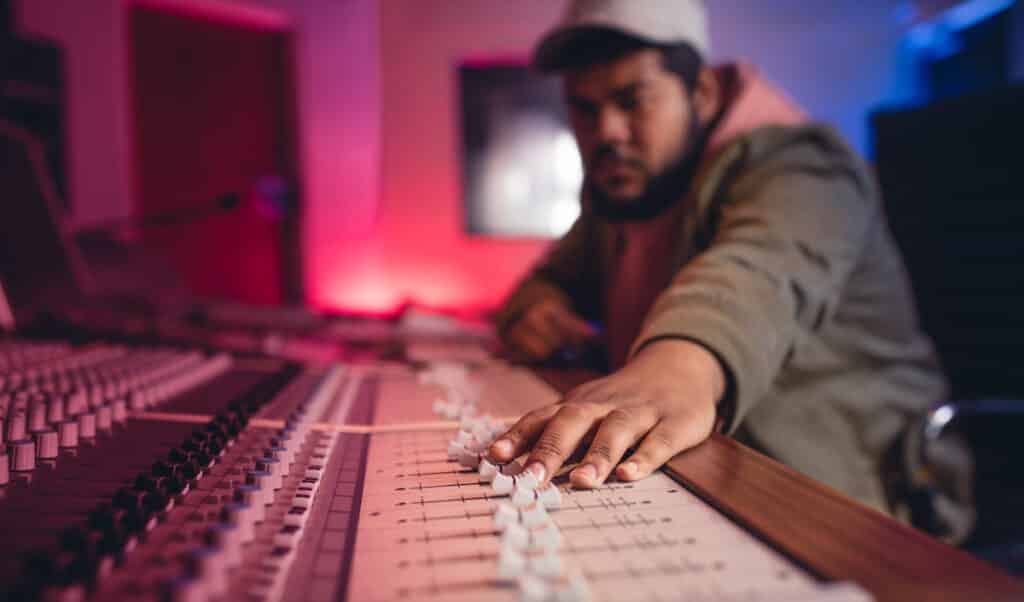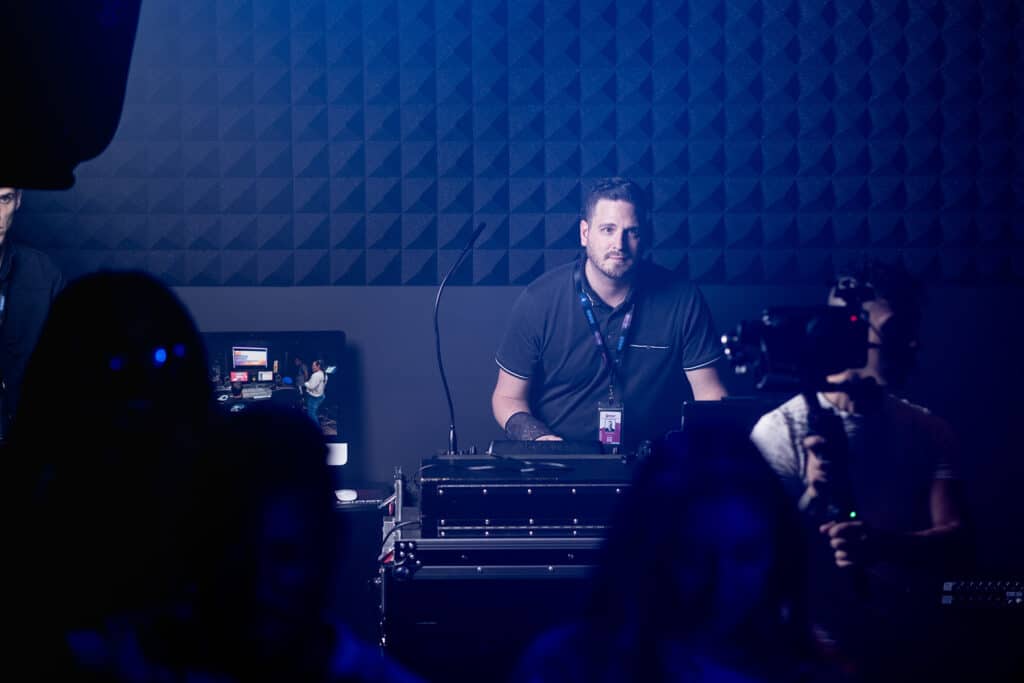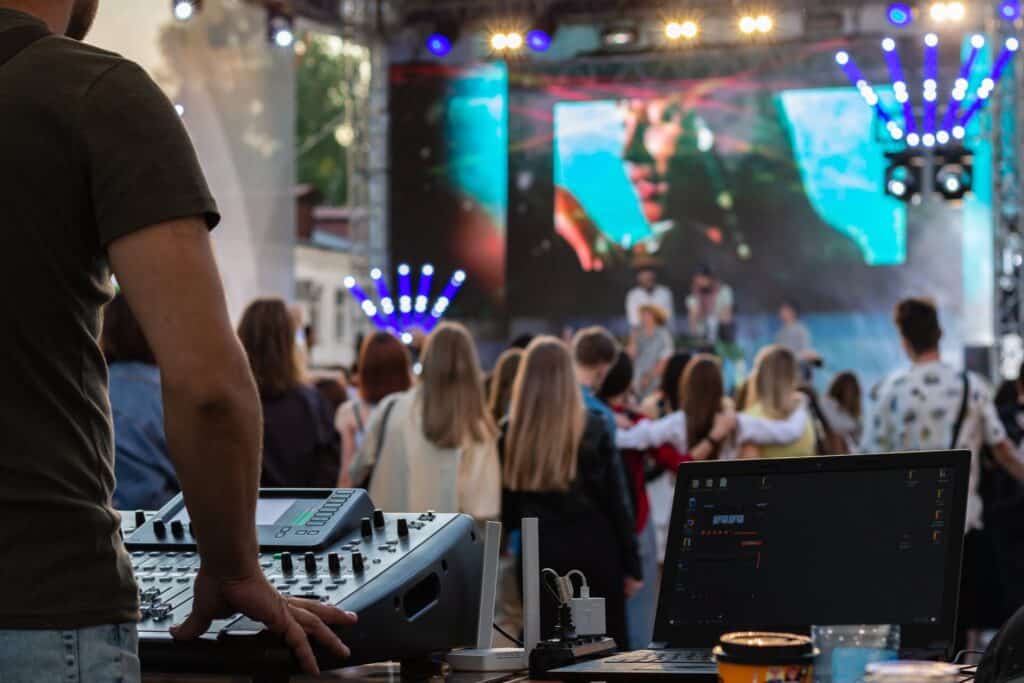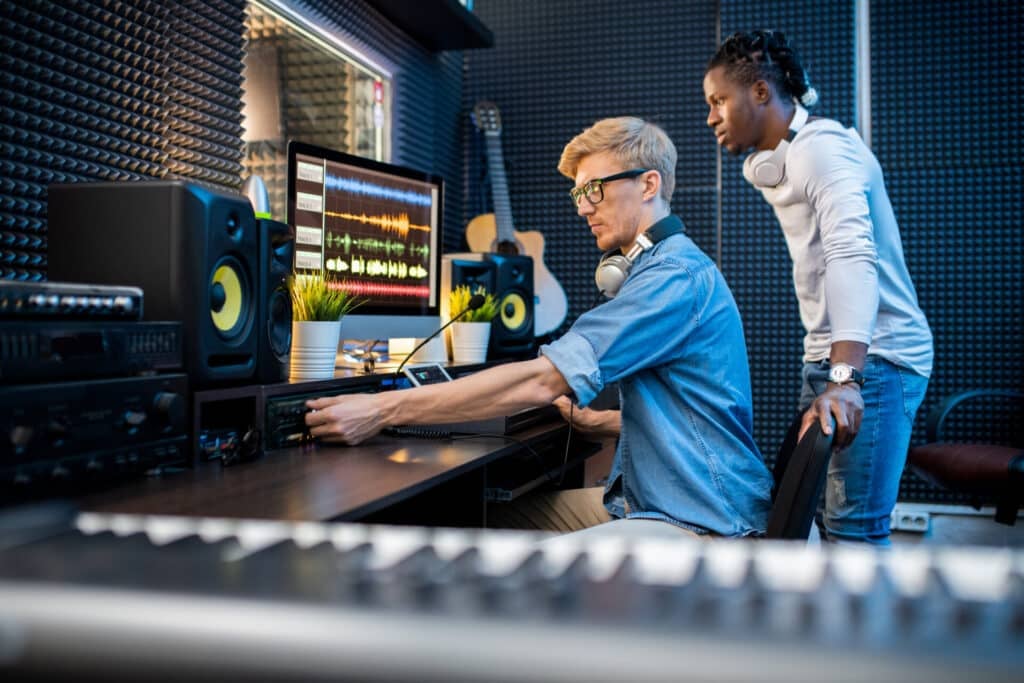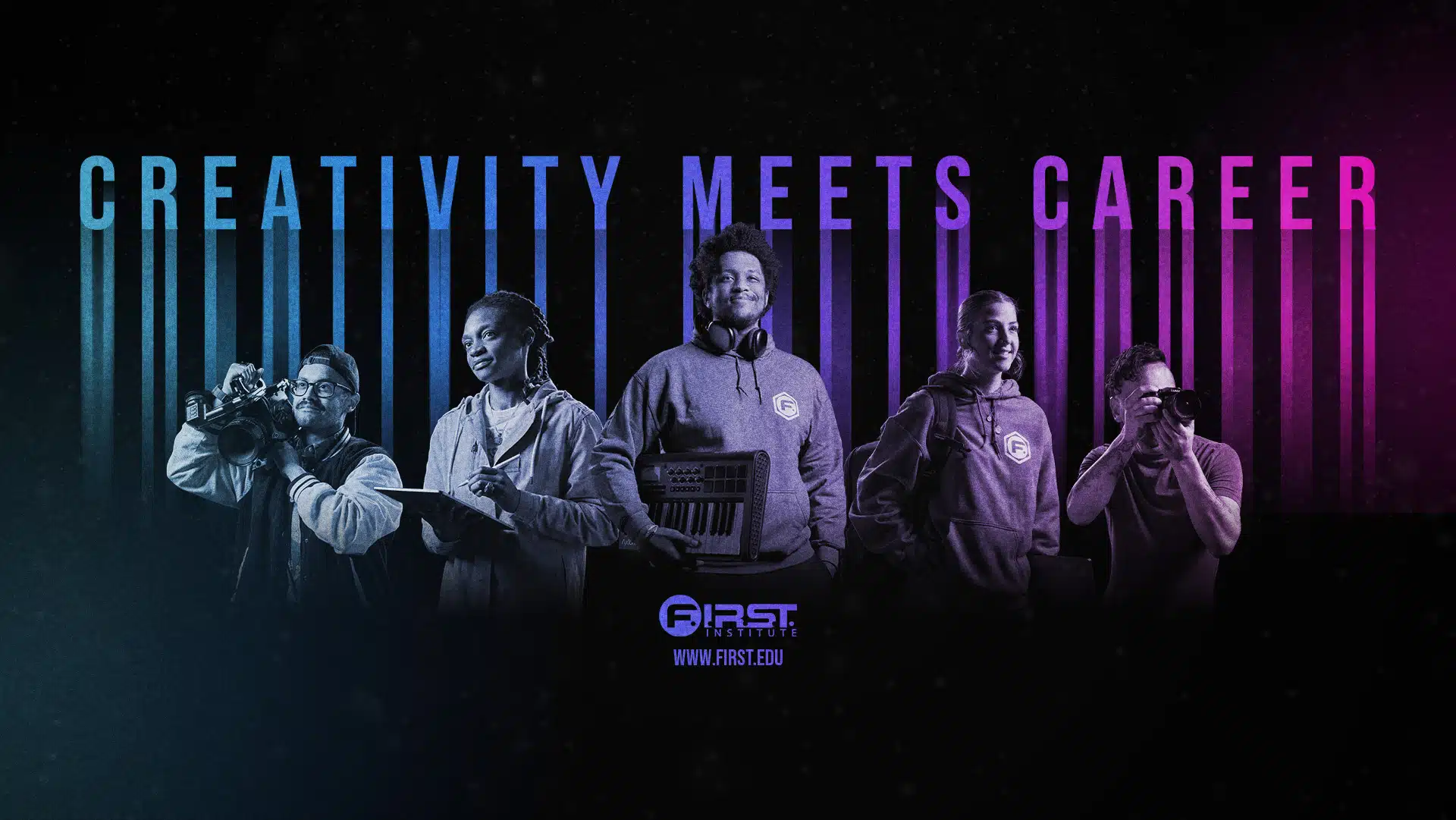If you want to get started in the audio engineering industry, you’ve come to the right place. Here at F.I.R.S.T. Institute, we have a recording arts program that will give you the skills you need to start a career in audio engineering. First things first, what is audio engineering? What does an audio engineer do? Do I need to attend an audio engineering school to become an audio engineer? What is “recording arts?” We know you have many questions about audio engineering, and we’re here to help answer them all.
WHAT DOES AN AUDIO ENGINEER DO?
Well, it depends on who you ask. The very foundation of audio engineering is getting sound from one place to another. Let’s use a good example. I want you to think about a concert. Audio engineers play a significant role in ensuring all concert sounds go on without a hitch. There’s a lot to it; think about the vocalist, the instruments, the speakers for the crowd. Ensuring all the sounds do what they are supposed to do and go where they’re supposed to go is the job of an audio engineer. Without audio engineering, you couldn’t hear songs from your favorite artist. You couldn’t enjoy them on the radio or Sirius XM. You wouldn’t be able to enjoy an artist performing at a concert. You wouldn’t be able to enjoy your favorite television series either. Audio engineers play a vital role in ensuring you enjoy your entertainment, at least from sound.
AUDIO ENGINEERING
There’s a wide range of jobs that would be labeled under “audio engineering.” Let’s use the recording studio, for example. An audio engineer in a recording studio will be responsible for many different things, such as preparing the absolute best studio environment. Audio engineers don’t stop there; they’re also responsible for meeting clients and ensuring they can deliver exactly what they want. This will likely be recordings for most artists that go to a studio. It’s your job to provide sound quality, so they have a great product to work with.
RECORDING
Recording is the first step in making a record. The audio engineer is going to be responsible for the following;
- Setting up musical instruments
- Tuning up musical instruments
- Choosing the right microphones
- Placing all microphones
- Running all the appropriate cables
- Routing the signals
- Setting up audio mixing consoles
- Setting up outboard audio equipment
- Recording the audio
Now, most microphones will be used to record their tracks. This allows the audio engineer to adjust and edit sound as needed. Nearly all professionally recorded sounds use this method. This could also be called music production. Recording is a vital role in music production.
MIXING
The next step is called mixing. This is the second step in making a record. Mixing audio is a crucial step. Here, we discuss all the tracks we recorded and mix them into one final version. This is where we can experiment with panning different stereo channels, which refers to moving the audio left or right. We can also set EQs to make the instrument sound crisp and clean. We can find the exact sounds we’re looking for from automation, effects, and signal processors. In short, mixing is taking all of your recordings and creating a masterpiece out of them.
MASTERING
The last step in recording is called Mastering. Here, we take the final mixing recordings and finish them with processing. This may include;
- EQ Edits
- Limiting
- Compression
This process cleans up everything to deliver an excellent final recording to our client. Perhaps most importantly, this is where we ensure the sounds sound the same on every production recording. There are a lot of skills that go into mastering science as well. It would be best if you learned how to use EQ, take out noises, remove unwanted frequencies, and much more. Here are a few more jobs for a recording engineer.
- Radio And Television Broadcasting
- Audio Book Recording/Editing
- Commercial Production
- Post Production Engineering
- Game Audio Designer
Audio Engineering OUTSIDE OF THE STUDIO
Sure, an audio engineer may spend much time working in a recording studio, but not all the time. Think about it: what about live performances? If you took your typical day and paid close attention to all the sounds you hear, I bet it would surprise you how much you hear. Next time you get a chance, give it a try. When you hear those sounds, know someone was likely paid to make that sound! What About Live Sound? A live sound engineer is one of the hottest markets in the audio engineering career field. It’s one thing to create sounds in a recording studio and another to develop sounds outside the studio walls “Live.” Nearly all venues have a sound engineer. Heck, almost all artists and bands have a sound engineer, too. Maybe you can work at your favorite venue or with your favorite artist/band.
CORPORATE, BUSINESS AND TECHNOLOGY
It’s common for big companies to have an audio engineer, perhaps even an audio team. With all the up-and-coming entrepreneurs doing live events, there’s always a need for good, sound engineers. Think about some of the most significant events companies like Google, Apple, and others host; you may just be able to land a job with them! While setting up microphones and speakers is the basics of audio, there are many jobs out there for you to get your first break.
BRAND NEW TECHNOLOGY
Technology is constantly advancing, allowing you to help them demonstrate its use. New companies launch all the time, and many of them have significant needs for audio and video. As long as you know the fundamentals of sound and audio, you’ll have the skills to do just that. Plus, it’s an excellent opportunity to showcase your skills and meet new people, “networking.”
ENVIRONMENT SOUND DESIGN
Although it may have been some time since you last went to the mall, do you recall hearing music or sounds as you walked the halls? You guessed it, somebody made that for them. With shopping malls and centers nationwide, this category’s opportunities are limitless. It’s not only music. Think about all the speakers and wiring that must be set up to make environmental sound happen.
WHERE SHOULD I GO TO AUDIO ENGINEERING SCHOOL?
We’re proud to have you here on our blog. If you’ve made it this far, you likely have a real passion for learning audio engineering. An audio engineering education may be the choice for you. While there are a lot of different schools to learn audio engineering, few can offer you what we can here at F.I.R.S.T. Institute. We’re one of the top audio engineering schools in the country. We can also help you land your first audio engineering internship. Here’s a list of some of the job possibilities out there in the industry, provided you have experience in audio production and engineering:
Re-Recording Mixer/Dubbing Mixer
WHAT STUDENTS SAY ABOUT OUR RECORDING ARTS AND SHOW PRODUCTION PROGRAM
F.I.R.S.T. Institute’s Recording Arts program is a beacon of excellence in audio engineering and music production, garnering a laudable 4.6-star rating on Google Reviews. The program has been praised consistently for its comprehensive curriculum, supportive environment, and the impressive expertise of its instructors. Students particularly cherish the nurturing ambiance at F.I.R.S.T., which is instrumental in fostering their growth and success. One student, about to finish the recording arts and show production program, lauded the program’s adaptability, highlighting how the courses are continuously being updated to stay relevant.
The Recording Arts program is not just an educational course; it’s an experience that shapes the future of its students. It’s where aspiring audio engineers, music producers, and recording artists can immerse themselves in their passion, hone their skills, and embark on a successful career. The institute’s commitment to the success of its students is evident in the glowing reviews it receives, with an overwhelming 83% of employees recommending it on Glassdoor.
What sets F.I.R.S.T. Institute apart is the quality of its programs and the opportunities it provides for real-world experience. Students are given ample opportunities for hands-on learning, ensuring they are well-equipped to navigate the industry post-graduation.
Choosing F.I.R.S.T Institute’s Recording Arts program is more than just opting for an education—it’s choosing a path to success in the dynamic world of audio engineering and music production. Contact us today and learn more about the F.I.R.S.T. Institute Advantage.

